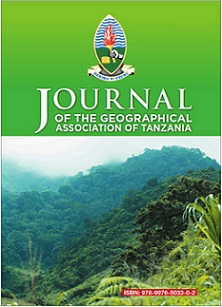Variability in Rainfall Onset, Cessation and Duration in Lukuledi River Catchment, Southern Coast of Tanzania
Abstract
Most rural coastal communities in Tanzania rely heavily on agriculture for their livelihoods, and yet have limited climatological information on inter-seasonal variability of rainfall onset, cessation, and duration. This paper analyses rainfall onset, cessation, and duration of the Lukuledi river catchment, which has nearly 87% of its community depending on rainfed agriculture; and where rainfall uncertainties are reported to have negatively impacted agricultural activities. The paper used daily rainfall data from 1970 to 2015, standard deviations, coefficients of variation, and Mann Kendall statistics to identify variabilities and trends of rainfall onsets, cessation, and duration. Onset-duration relationship was also established. Results show that rainfall onset is more variable than cessation, with standard deviation ranging from 22 to 29 days; while that of cessation was between 11 and 16 days. Coefficients of variation of the onsets were between 27% and 44%; while those of cessation ranged from 5% to 8%. The period between 1970 and mid-1980s had early onsets, which shifted to late onsets in post-1985, with increasing incidences of fake onsets. Onset and rainfall duration had negative correlation, whereby one of the stations (Narunyu) had a weak correlation, r (38) = -0.19, p = .24; and the remaining stations depicted very strong correlations: Nachingwea, r (44) = -0.88, p < .00001; Mahiwa, r (29) = -0.86; p < .00001; and Masasi, r (14) = -0.86, p = 0.000019. All this indicates that onsets can be good predictors of rainfall duration. Thus, we suggest the use of observed onset-duration relationship, in combination with climate forecasts, to enhance agricultural plans and decisions.
Keywords: rainfall variability, onset, cessation, duration.


